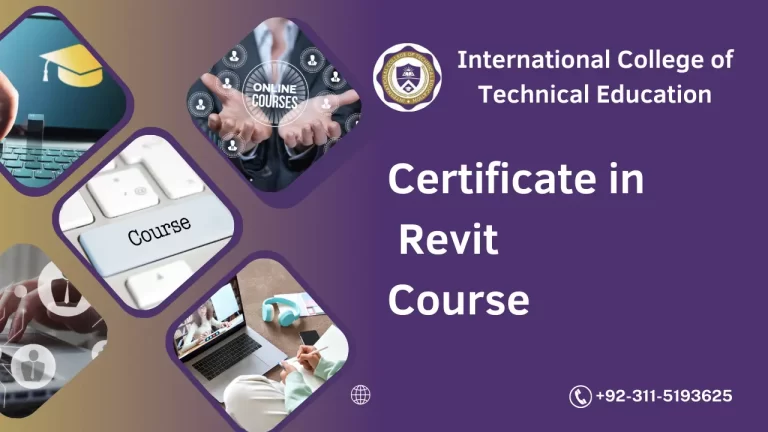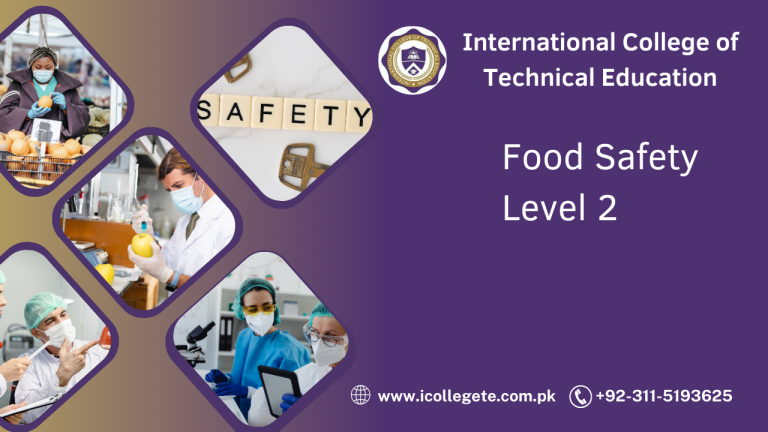In today’s food industry, maintaining high standards of food safety is critical for public health, business reputation, and regulatory compliance. The Food Safety Level 3 course in Sargodha is designed for those who are responsible for overseeing and managing food safety practices within a business or organization. This advanced-level course goes beyond the basics and delves into the complex aspects of food safety management, equipping participants with the skills to ensure that their workplace adheres to the highest food safety standards.
The Food Safety Level 3 course is an advanced training program designed for individuals who have a leadership or supervisory role in food safety management.
This course is ideal for food safety managers, supervisors, quality control staff, and anyone responsible for ensuring that food safety practices are followed in their workplace. Whether you are working in a restaurant, catering service, food manufacturing plant, or retail food business, this course will provide the expertise necessary to effectively manage food safety.
Course Overview
The Food Safety Level 3 course in Sargodha is designed to provide participants with a comprehensive understanding of food safety management systems and practices. The course covers a broad spectrum of topics, including hazard analysis, risk assessment, food safety audits, regulatory compliance, and emergency response procedures.
Throughout the course, participants will explore the key principles of food safety management and how to apply them in real-world situations. The course combines theoretical knowledge with practical strategies that can be used to prevent foodborne illnesses, ensure hygiene standards, and promote a culture of food safety within a business.
Study Units
The Food Safety Level 3 course typically includes the following study units:
- Introduction to Food Safety Management
- The role of food safety management in maintaining public health and business reputation.
- Overview of food safety systems and regulations.
- Hazard Analysis and Critical Control Points (HACCP)
- Understanding the HACCP principles and their role in food safety.
- How to apply HACCP in the workplace to identify and control food safety hazards.
- Risk Assessment and Risk Management
- Techniques for identifying potential risks in food handling and processing.
- How to assess and prioritize risks to prevent contamination.
- Food Safety Regulations and Legislation
- In-depth review of national and international food safety laws and regulations.
- Understanding the legal responsibilities of food businesses and staff.
- Food Safety Management Systems
- Developing and implementing food safety management systems within a business.
- How to monitor and review food safety practices effectively.
- Foodborne Illness Prevention
- The causes of foodborne illnesses and how to prevent outbreaks.
- Best practices for controlling foodborne pathogens in food preparation and storage.
- Sanitation and Hygiene Practices
- Developing cleaning and sanitation protocols to maintain food safety.
- Importance of effective hygiene practices for food handlers and equipment.
- Allergen Management
- How to identify, manage, and label allergens in food products.
- Preventing cross-contamination and ensuring allergen safety for consumers.
- Food Safety Audits and Inspections
- Conducting internal audits to evaluate food safety practices.
- How to prepare for external inspections and audits by regulatory bodies.
- Emergency Response and Crisis Management
- Planning for food safety emergencies and potential contamination events.
- Procedures for managing food recalls and incidents of foodborne illness.
Learning Outcomes
Upon completing the Food Safety Level 3 course, participants will be able to:
- Understand the complex principles of food safety management and apply them in the workplace.
- Implement and manage a comprehensive food safety system based on HACCP principles.
- Conduct risk assessments and take proactive steps to minimize food safety risks.
- Ensure compliance with national and international food safety regulations and legislation.
- Lead food safety audits, inspections, and reviews to identify areas for improvement.
- Manage foodborne illness prevention strategies and develop effective response plans.
- Train and supervise staff on food safety practices, ensuring that food safety standards are consistently met.
- Understand allergen management requirements and ensure proper labeling and handling procedures.
Course Benefits
- Advanced Knowledge: Gain in-depth knowledge of food safety management systems, making you an expert in food safety practices.
- Leadership Skills: Learn how to lead and manage food safety teams, implement food safety systems, and ensure compliance with laws and regulations.
- Career Advancement: This course is ideal for individuals aiming for senior roles in food safety management, such as food safety managers, supervisors, and quality control officers.
- Regulatory Compliance: Learn how to navigate the complexities of food safety regulations, ensuring your business remains compliant with national and international laws.
- Risk Management: Develop the skills necessary to identify food safety risks and take appropriate measures to mitigate them, safeguarding both consumers and the business.
- Enhanced Food Safety Culture: By applying the principles learned in this course, participants can foster a stronger food safety culture within their workplace, reducing the risk of foodborne illness outbreaks and enhancing consumer trust.
Who Is This Course For?
The Food Safety Level 3 course is ideal for:
- Food Safety Managers: Professionals who are responsible for overseeing food safety practices and systems in their organization.
- Supervisors and Team Leaders: Supervisory staff in food businesses who are responsible for training and supervising food handlers.
- Quality Control Personnel: Individuals who monitor and enforce quality standards in food production and service environments.
- Catering and Hospitality Managers: Managers in the catering, hotel, and restaurant sectors who oversee food handling and safety practices.
- Compliance Officers: Professionals tasked with ensuring that food businesses comply with food safety regulations and standards.
- Health and Safety Consultants: Individuals offering consultancy services to businesses in the food industry, helping them implement food safety systems.
Future Progression
Upon completion of the Food Safety Level 3 course, participants can continue to advance their expertise in food safety by pursuing:
- Food Safety Level 4: A higher-level course designed for those with greater responsibilities in food safety management, such as senior managers or those responsible for multiple food facilities.
- HACCP Advanced Training: Further specialization in Hazard Analysis and Critical Control Points (HACCP) to deepen knowledge in food safety risk management.
- Lead Auditor Courses: Training in auditing food safety management systems to ensure compliance with regulations and industry standards.
- NEBOSH Certificate in Food Safety: For those looking to combine food safety expertise with broader health and safety qualifications.
- Specialized Food Safety Training: Additional courses in specific areas like allergen management, food safety auditing, or crisis management in food businesses.
These advanced certifications can open doors to more senior roles in the food safety field, including positions as food safety consultants, senior quality assurance managers, or regulatory compliance experts
The Food Safety Level 3 course in Sargodha is a comprehensive program designed for professionals who are responsible for managing and ensuring food safety practices within an organization. By completing this course, participants will not only improve their knowledge of food safety but also gain the skills necessary to implement and monitor food safety systems effectively. This course provides a solid foundation for those seeking to advance their careers in food safety management, regulatory compliance, or quality control in the food industry.







